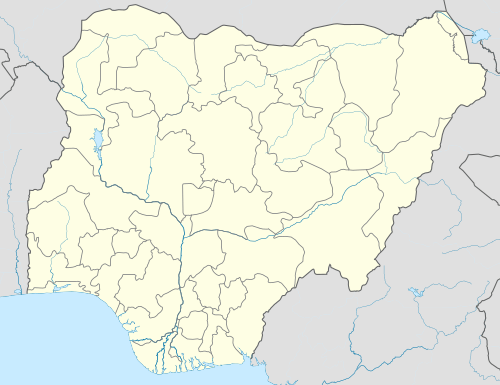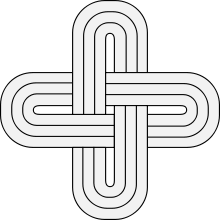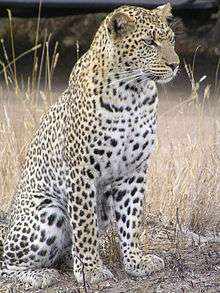Akure Kingdom
The Akure Kingdom is a traditional state with headquarters in Akure, Ondo State, Nigeria. It is the successor to an ancient Yoruba city state of the same name. The ruler bears the title "Deji of Akure".
Akure Kingdom | |
|---|---|
Traditional state | |
 Akure Kingdom Location in Nigeria | |
| Coordinates: 7°15′0″N 5°11′42″E | |
| State | Ondo State |
| Founded by | King Omoremilekun Asodeboyede |
| Government | |
| • Deji | Odundun II |
Location
Akure is located in southwestern Nigeria. The climate is hot and humid, influenced by rain-bearing southwest monsoon winds from the ocean and dry northwest winds from the Sahara Desert. The rainy season lasts from April to October, with rainfall of about 1524mm per year. Temperatures vary from 28oC to 31oC with mean annual relative humidity of about 80%.[1]
Foundation
Oral tradition states that Akure was founded by a prince named Omoremilekun, son of Ekun, grandson of Okanbi, and great-grandson of Oduduwa Omoluwabi, the royal progenitor of the Yoruba tribe. The prince left Ile-Ife, his fatherland, in search of a place to settle after passing a strict test administered by Oduduwa himself. This test wherein he was kept in solitude for about nine (9) days is still annually commemorated in Akure today by the reigning king of the town during a ceremony known as 'Oba wo ilesunta'. At the point where the prince and his party arrived at the exact location of the modern city, the string holding the heavy royal beads on his neck is said to have snapped, thus causing the people to exclaim "Àkún rẹ" (or The beads have snapped), this later becoming the name of the settlement they established on the site. Over time, the phrase was whittled down through its constant use to become Akure.
Omoremilekun is said to have hunted with his entourage while on his way from Ile Ife. He arrived in Akure and was proclaimed the "Aṣodẹboyèdé" (or The person who hunted and arrived with royalty). The palace that was built to house him still stands and dates to 1150 AD.
Originally, the kings of Akure that were born of him were referred to as Ajapada. The title Deji of Akure started with Oba Ogunja (r.1533-1554), whose father, Oba Olofinleyo (r. 1434-1474) took the daughter of Oba Atakunmosa, the Owa of Ijeshaland, as one of his wives while the latter was on his way to Benin. By the time Oba Atakumosa was returning to Ilesha from the pilgrimage, his daughter Omoba Owawejokun had given birth to a son. While other dignitaries gave the little baby common gifts, Oba Atakunmosa was said to have presented his grandson with a small diadem. Owafadeji (i.e. Owa gave him a diadem) became the praise name of the young boy, and by the time he reached his adulthood it had become his de facto name. When Owafa'Deji became Oba, the appellation assumed a titular importance and because of his prominence as an Oba, subsequent Obas or kings assumed the title while the advent of the modern era has formally made Deji the official title of the Obas of Akure. However, the original title of Ajapada has remained a significant part of the Deji's ceremonial style till the present day.

The Ado-Akure
During its long history, the city-state of Akure was at times independent, at times subject to other states. Due to this, there is now a sizable population of partial Bini descent within the kingdom. They are known as the Ado-Akure. Akure was the main base for Benin's trade in the area, and at times seems to have been considered within the western frontier of Benin. The Ado-Akure were therefore originally something of a colony, and are said to be descended from Benin warriors who took Akure brides upon settling in the kingdom. The Benin historian Egharevba, who was himself a part of the Ado-Akure community, refers to suppression of resistance by "rebellious Akure" during the reign of Oba Ewuare of Benin (1440–1473), although the Deji was allowed to remain as nominal ruler. Another rebellion is recorded a century later during the reign of Oba Ehengbuda of Benin.[2] In the 19th century Osupa I, the son of the Akure king Arakale and a Benin princess, ascended the throne of Akure. He subsequently gave his fellow Ado-Akure land to settle and chieftaincies to hold.
Later history
| House of Omoremilekun Asodeboyede | |
|---|---|
| Nigerian royal dynasty | |
| Parent house | Oodua |
| Current region | Yorubaland |
| Founded | c.12th century |
| Founder | Omoremilekun |
| Current head | Odundun II |
| Titles | |
| Style(s) | Kabiyesi Majesty Royal Highness |
| Members |
|
| Connected families | Ijesha royal family Bini royal family |
| Religion | Yoruba religion Christianity Islam |
| Motto | Omo Owa, Omo Ekun (Yoruba for "A child of the Owa, a child of the Leopard") |
| Cadet branches |
|
Akure had regained its independence by the early 19th century, but around 1818 it was recaptured by Benin forces and the Deji was executed.[2] This set in motion a chain of events that culminated in the reign of Osupa I. After 1854, Akure and other Ekiti towns came under the rule of Ibadan, which lasted until a rebellion in 1876 followed by a prolonged war between the Yoruba states.[3]
Towards the end of the 19th century the British based on their Lagos Colony had established a protectorate over the area, although they ruled through "native" administrations. The British sought to combine the Ekiti kingdoms of the region into a single administrative unit, against resistance by the Ekiti people who preferred local autonomy. In 1899 Ekiti and Ilesha formed the northeastern division of the protectorate. In 1915, Ekiti, Owo and Ondo were combined to form the Ondo Province with headquarters at Akure.[4] Ondo Province later became part of Western State. In 1976 the old Ondo State was formed, and in 1996 Ekiti State was split off from the modern Ondo State, which has Akure as its capital.
The death in October 1999 of Oba Ataiyese Adebobajo Adesida IV led to a prolonged dispute over the succession, eventually resolved with the appointment of Oba Oluwadamilare Adesina in 2005. Oba Oluwadamilare was dethroned on 10 June 2010 for sacrilegious misdeeds (wife beating) and Adebiyi Adegboye Adesida Afunbiowo II was chosen as the new Deji of Akure on 13 August 2010.[5] His daughter, the Omoba Adetutu, was appointed princess regent following his demise on 30 November 2013.
Structure
Akure's King is known as the Deji of Akure and is supported by six high chiefs or iwarefa in his or her domain. The symbol of Akure is the Leopard and the father of Omoremilekun Omoluabi was himself called Ekun (this was his regnal name) . It is for this reason that every descendant of the Akure clan has been addressed by outsiders as Omo Ekun during the recitation of his or her praise poetry or, alternatively, as 'Omo Akure Oloyemekun', since Omoremi was said to have stayed for a while at Igbo Ooye before coming to the Akure region. [6] After the death or removal of an Oba, a princess regent is appointed under the title of Adele,[7] who is expected to oversee the day-to-day administration of the kingdom while the kingmakers select the next Oba from one of the royal houses.[8]
Although the Oba has relocated to a more modern palace, the old building from 1150 AD is still used for all ceremonies.[9] The place has over 15 courtyards, with each having its unique purpose. Ua nla, Ua Ibura, Ua jemifohun, Ua Ikomo are some of the names of the courtyards. For example, in the Ua ubura courtyard, oaths are taken, and the ua Ikomo is used for naming ceremonies.
In addition to those of the Deji and the Adele, other titles are also borne by Akure royals. The titles of the Oloyes of the Omowas, the Iyaafins, the Omobas and the Olooris are either bestowed by the Deji (in the cases of the former two) or acquired upon birth or marriage (in the cases of the latter two). The Oloyes of the Omowas are the titular chief princes and princesses of Akure. According to tradition, they are expected to serve as leaders within the royal families. The Iyaafins, meanwhile, are the nominal leaders of the female royals. There is usually only one Iyaafin at any given time and she is traditionally either the reigning Deji's mother, step-mother or ceremonial surrogate mother in the first instance, or his senior wife in the second one (where the Deji is himself a polygamous male). The Omobas are the rank and file princes and princesses, any of the many members of the Omoremilekun Asodeboyede dynasty. Lastly, the Olooris are women that marry into the royal families. Their number would consist of a male Deji's wife or wives, the wives of the male Oloyes of the Omowas, and the wives of the male Omobas.
There are two other constituent communities with their separate chiefs and traditions within the modern Akure kingdom. The more prominent of the pair is Isikan while the second of them is Isolo. The Baale of Isikan is known as the Iralepo while the Baale of Isolo is known as the Osolo of Isolo. In the olden days these were separate towns, but they were brought together under the nominal control of Akure as a result of a number of wars. Nearby towns include Isarun, Ilara-Mokin, Igbara-Oke, Iju, Itaogbolu, Idanre, Owo, Ikere and Ondo.
Royal houses
Originally there was only one ruling house of Akure, Omoremilekun Asodeboyede, founded by the first king in the kingdom, Omoremilekun. The kingship passed down through an essentially ambilineal descent line (due to the fact that the kingdom had a few female monarchs) until the 29th king, Oba Arakale (r. 1768-1818), who had two sons, Oba Osupa and Oba Ojijigogun. These two kings are the progenitors of the cadet branches of the Asodeboyede ruling house, Osupa and Ojijigogun. The main royal family of the Osupa house is Odundun, whose progenitor is Oba Odundun, one of Osupa's sons and an ancestor of the current Deji of Akure, Oba Odundun II. The three royal families of the Ojijigogun ruling house are Arosoye, Adesida, and Ifaturoti, two of which were founded by ruling kings of Akure. Omoba Ifaturoti never became king, but his progeny is nevertheless recognized.
The Adesida family's reigning representatives were Adesida I, commonly called the Great (r. June 1897 - 1957), Ademuwagun Adesida (r. 1957–1973), Adelegan Adesida (r. 1975–1990), Adebobajo Adesida (r. 1990 - 1999) and Adebiyi Adegboye Adesida Afunbiowo II (r. 2010–2013). By the point when the Osupas were legally recognized in the early nineties, one Adesida or another had been ruling Akure for a little less than a century. As a result of this, the Adesidas ruled through some of Akure's most notable periods. These included Nigeria's independence in 1960, and the restoration of its democracy in 1999.
After the Adesida ruling family had ruled exclusively for many decades, descendants of Oba Odundun and Oba Osupa, such as Chief Olu Falae, petitioned the government to create a separate Osupa royal house for their descendants. This wish was granted with the legal recognition of the Osupa house in 1991.[10] This also led to the removal of the omo-ori-ite rule, which stated that a prince or princess could only become monarch if they were born after their father or mother had become monarch.[11] Because of this, grandchildren and great grandchildren of past rulers - in the male line - could now vie for the throne. This allowed Oba Osupa III, a supposed "great grandson" of Oba Osupa, to become king. Many claim that Oba Osupa lied about his relationship with the king and therefore bought his way to the throne.[12]. After he was deposed, another descendant of the Adesidas, Afunbiowo II, ruled for three years, before being succeeded by the current ruler Oba Odundun, a member of the Osupa ruling family.[13]
List of Dejis and Adeles of Akure

This is a list of the rulers of Akure since its founding in 1150 C.E. by Asodeboyede, a great-grandson of Oduduwa, who was the progenitor of the Yoruba race. [14][15]
As will be seen, the longest reigning king of Akure was initially Oba Arakale, who ruled for 50 years (1768-1818). He was later surpassed by his grandson Oba Adesida I Afunbiowo, who ruled for 60 years and is the longest reigning Deji in all of Akure history:
| Start | End | Ruler |
|---|---|---|
| 1150 | 1180 | Omoremilekun Asodeboyede Ajapada, founder of Akure |
| 1180 | 1200 | Omoloju Alakunre, 2nd Deji of Akure |
| 1200 | 1225 | Ogbolu, 3rd Deji of Akure |
| 1225 | 1245 | Odoro, 4th Deji of Akure |
| 1245 | 1261 | Obasisan, 5th Deji of Akure |
| 1262 | 1277 | Obarisan, 6th Deji of Akure |
| 1277 | 1287 | Otemoye, 7th Deji of Akure |
| 1287 | 1299 | Imolumode, 8th Deji of Akure |
| 1299 | 1305 | Olarako, 9th Deji of Akure |
| 1305 | 1313 | Ojaiyara, 10th Deji of Akure |
| 1313 | 1363 | Obagbeyi Adegbite, 11th Deji of Akure |
| 1363 | 1393 | Ogoga, 12th Deji of Akure |
| 1393 | 1419 | Eye Aro, 13th Deji of Akure |
| 1419 | 1434 | Elese Obaye, 14th Deji of Akure |
| 1434 | 1474 | Olofinleyo, 15th Deji of Akure |
| 1474 | 1494 | Olofinjigbayawo, 16th Deji of Akure |
| 1495 | 1513 | Obawaiye, 17th Deji of Akure |
| 1513 | 1533 | Obalua, 18th Deji of Akure |
| 1533 | 1554 | Ogunja "Owafadeji", 19th Deji of Akure |
| 1554 | 1576 | Oba Alaya, 20th Deji of Akure |
| 1576 | 1599 | Oriya, 21st Deji of Akure |
| 1599 | 1623 | Atakunmosa, 22nd Deji of Akure |
| 1623 | 1648 | Eleyogbute, 23rd Deji of Akure |
| 1648 | 1678 | Gbogi, 24th Deji of Akure |
| 1678 | 1705 | Amayabekun, 25th Deji of Akure |
| 1705 | 1735 | Eyemoin, 26th Deji of Akure |
| 1735 | 1748 | Orudu, 27th Deji of Akure |
| 1748 | 1768 | Ogoro, 28th Deji of Akure |
| 1768 | 1818 | Arakale, 29th Deji of Akure |
| 1819 | 1823 | Ogunlegboju, 30th Deji of Akure |
| 1823 | 1828 | Ausi, 31st Deji of Akure |
| 1828 | 1832 | Ajalaga, 32nd Deji of Akure |
| 1832 | 1834 | Osuan, 33rd Deji of Akure |
| 1834 | 1846 | Osupa I Arakale "Ogiso Otolu Apaara", 34th Deji of Akure |
| 1846 | 1849 | Agboyere, 35th Deji of Akure |
| 1850 | 1851 | Amorobiojo (Eyearo), 36th Deji of Akure |
| 1851 | 1852 | Omoremiosun, 37th Deji of Akure |
| 1852 | 1882 | Ojijigogun Arakale, 38th Deji of Akure |
| 1882 | 1890 | (Adegboro Adeagbo) Odundun I "Asodedero" Osupa, 39th Deji of Akure |
| 1890 | 8 January 1897 | Arosoye Ojijigogun, 40th Deji of Akure |
| June 1897 | 1957 | Adesida I Afunbiowo (Ojijigogun), 41st Deji of Akure |
| 1957 | December 1973 | Agunsoyebioyinbo Ademuwagun Adesida II, 42nd Deji of Akure |
| 1975 | 1991 | Otutubiosun Adelegan Adesida III, 43rd Deji of Akure |
| 1991 | October 1999 | Ataiyese Adebobajo Adesida IV, 44th Deji of Akure |
| 1999 | 2005 | Regent: Princess Adeyinka Adesida |
| 2005 | 10 June 2010 | Oluwadare Adesina Adepoju, "Osupa III", 45th Deji of Akure |
| 13 August 2010 | 30 November 2013 | Adebiyi Adegboye Adesida Afunbiowo II, 46th Deji of Akure |
| December 2013 | June 2015 | Regent: Princess Dr. Adetutu Adesida-Ojei |
| July 2015 | Present | Aladetoyinbo Ogunlade Aladelusi Odundun II, 47th Deji of Akure |
References
- Igbekele Ajibefun. "Akure City Profile" (PDF). International Water Management Institute. Archived from the original (PDF) on 25 July 2011. Retrieved 19 September 2010.
- Robert Sydney Smith (1988). Kingdoms of the Yoruba. Univ of Wisconsin Press. p. 134. ISBN 0-299-11604-2.
- Jeremy Seymour Eades (1980). The Yoruba today. CUP Archive. p. 9. ISBN 0-521-22656-2.
- Andrew Herman Apter (1992). Black critics & kings: the hermeneutics of power in Yoruba society. University of Chicago Press. p. 166. ISBN 0226023427.
- "Former Nigerian Presidential Aide, Adebiyi Adesida, Becomes the New Deji of Akure". SharpEdgeNews. 12 August 2010. Archived from the original on 17 August 2010. Retrieved 13 September 2010.
- name=compass689>"46th Deji's tortuous journey to Akure palace". NIGERIAN COMPASS. 13 September 2010. Retrieved 18 September 2010.
- Akintide, Wumi (21 January 2014). "The Role Of Regents In Yoruba Tradition". Retrieved 29 April 2020.
- "Ondo removes Akure Oba". Next. 10 June 2010. Archived from the original on 6 August 2010. Retrieved 18 September 2010.
- MAURICE ARCHIBONG (6 August 2009). "Struggles to breathe life into National Museum Akure after 21-year dormancy". Daily Sun. Archived from the original on 11 April 2010. Retrieved 18 September 2010.
- http://royal.sub.royal.ng/team_mf/oba-aladetoyinbo-ogunlade-aladelusi-odundun-ii/
- http://focxis.blogspot.com/2014/02/few-of-unsung-heroes-of-akure-by-dr.html
- http://saharareporters.com/2014/01/09/embattled-deji-has-bought-his-way-out-akure-crisis-dr-wumi-akintide
- http://saharareporters.com/2015/06/07/new-monarch-prince-aladetoyinbo-emerges-deji-akure-kingdom
- Dr. Wunmi Akintide. "DEJI OF AKURE – PART 8". Gamji. Archived from the original on 11 July 2011. Retrieved 18 September 2010.
- Dr. Olugbenga Ige. "The Selection Process of a King in Oda". AFRREV IJAH. Retrieved 6 October 2019.
